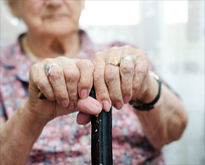27.3 million people aged 80 and over ("elderly people") were living in the European Union (EU) in 2016, 7 million more than ten years ago.
The growing share of elderly people in the EU (from 4.1% in 2006 to 5.4% in 2016) means that, in 2016, one in every 20 persons living in the EU was aged 80 and over. The ageing of the population structure is, at least partly, the result of an increasing life expectancy. This increase has meant that life expectancy for 80 year-olds rose from 8.4 years in 2005 to 9.2 years in 2015.
Although the proportion of women in the population aged 80 and over shrank between 2006 and 2016, they still accounted for around two-thirds (64%) of elderly people in the EU. All Member States have an over-representation of women among people aged 80 and over.
This news item marks the International Day of Older Persons, celebrated each year on 1 October.
Highest proportion of elderly people in Italy and Greece
The share of elderly people tended to be higher in the southern Member States, with the highest percentages registered in 2016 in Italy (6.7%), Greece (6.5%), Spain (6.0%) and Portugal (5.9%). Germany followed with 5.8% of its population aged 80 and over. In contrast, Ireland (3.1%), Slovakia (3.2%) and Cyprus (3.3%) registered the lowest proportions of elderly people in their population.
Compared with 2006, the share of people aged 80 or over rose by 2016 in all Member States, except Sweden. The largest increase was registered in Greece (from 4.1% in 2006 to 6.5% in 2016, or +2.4 percentage points - pp), ahead of Lithuania (+2.1 pp), Portugal (+1.9 pp), Estonia, Latvia and Slovenia (all +1.8 pp), Spain, Croatia and Romania (all +1.7 pp) as well as Italy (+1.6 pp).
The source dataset can be found here.
People aged 80 can expect to live longest in France, Spain and Luxembourg
At EU level, the average life expectancy at the age of 80 stood at 9.2 years in 2015. People aged 80 in 2015 could expect to live ten and a half years more in France, and about ten years more in Spain (9.9 years), Luxembourg (9.8 years), Italy and Finland (both 9.5 years).
At the opposite end of the scale, the lowest life expectancy at the age of 80 was recorded in Bulgaria (6.9 years), followed by Croatia and Romania (both 7.4 years), Hungary (7.6 years) and Slovakia (7.7 years). In every EU Member State, life expectancy at the age of 80 was higher for women than for men.
The source dataset can be found here.
For more information
Eurostat website section and database on population.
Eurostat website section and database on mortality indicators and life expectancy.
Eurostat Statistics Explained articles: "Population structure and ageing" and "Mortality and life expectancy statistics".
Eurostat interactive tool "A look at the lives of the elderly in the EU today"



